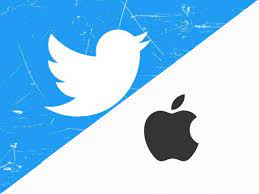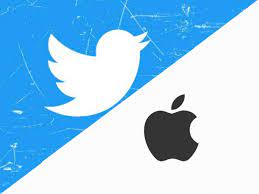
Since taking over Twitter last month, Elon Musk has announced significant, albeit perplexing, plans for the social network.
Musk wants to significantly increase the company's subscription revenue while also allowing more "free speech," which appears to mean restoring previously banned accounts such as former President Donald Trump's.
However, Musk's plans for Twitter may put it at odds with two of the most powerful tech companies: Apple and Google.
One of the most serious risks to Musk's vision for "Twitter 2.0" is that his changes will violate Apple or Google's app rules, slowing the company down or even getting its software removed from app stores.
Tensions are already high. Musk recently complained in a tweet about app store fees that Google and Apple charge companies like Twitter.
“App store fees are obviously too high due to the iOS/Android duopoly,” Musk tweeted. “It is a hidden 30% tax on the Internet.” In a follow-up post, he tagged the Department of Justice’s antitrust division, which is reportedly investigating app store rules.
His complaint is about the 15% to 30% cut Apple and Google take on purchases made within apps, which could eat into Musk's desperately needed revenue from Twitter Blue subscriptions at $8 per month.
Phil Schiller, the former head of Apple marketing who still oversees the App Store, appears to have deleted his popular Twitter account with hundreds of thousands of followers over the weekend.
There are indications that since Musk took over, Twitter has seen an increase in harmful content, putting the company's apps at risk. A wave of online trolls and bigots flooded the site with hate speech and racist epithets in October, shortly after Musk became "chief Twit."
The trolls banded together on 4chan before storming Twitter with anti-Black and anti-Jewish slurs. According to the nonprofit Network Contagion Research Institute, Twitter suspended many of the accounts.
Musk's plan to offer paid blue verification badges has also resulted in chaos and accounts impersonating major corporations and figures, causing some advertisers to avoid the social network, most notably Eli Lilly after a fake verified tweet incorrectly stated that insulin would be provided for free.
The app stores took notice.
“And as I departed the company, the calls from the app review teams had already begun,” former Twitter head of trust and safety Yoel Roth wrote this month in the New York Times.
Twitter and Apple have been working together for many years. Tweets were deeply integrated into Apple's iOS operating system in 2011. Apple CEO Tim Cook's account frequently posts tweets that serve as official company communications. Apple has used Twitter to promote new iPhones and major launch events.
However, the relationship appears to be changing as Musk seeks to generate a larger portion of his revenue through subscriptions.
In 2021, Twitter reported $5.08 billion in revenue. If half of that revenue comes from subscriptions in the future, as Musk has stated, hundreds of millions of dollars will go to Apple and Google — a small amount for them, but a potentially massive hit for Twitter.
One of Apple’s main rules is that digital content — game coins, or an avatar’s outfit, or a premium subscription— that’s purchased inside an iPhone app, has to use Apple’s in-app purchasing mechanism, in which Apple bills the user directly. Apple takes 30% of sales, decreasing to 15% after a year for subscriptions, and pays the remainder to the developer.
Companies such as Epic Games, Spotify, and Match Group lobby against Apple and Google’s rules as part of the Coalition for App Fairness. Microsoft and Meta have also filed briefs in court criticizing the system and made public remarks aimed at app stores.
Musk could follow Spotify's lead and offer a lower $9.99 price on the web, where it does not pay Apple a cut, and then users simply log in to their existing account inside the app. Users who pay $12.99 for a Premium subscription inside the iPhone app effectively cover Apple's fees.
Twitter could also go as far as Netflix, which stopped selling subscriptions through Apple entirely in 2018.
Musk could sell Twitter Blue for a lower price on the company's website and notify his over 118 million followers that Blue is only available on Twitter.com. It might work and keep Apple from having to pay any fees.
However, this would necessitate the removal of many options for informing users about the subscription within the app, where they are most likely to make a purchase decision. And Apple has strict guidelines for what apps can link to when informing users about alternative payment methods.
"You can't sign up for Netflix in the app," says the Netflix app. We understand how inconvenient it is."
(Source:www. thewest.com.au)
Musk wants to significantly increase the company's subscription revenue while also allowing more "free speech," which appears to mean restoring previously banned accounts such as former President Donald Trump's.
However, Musk's plans for Twitter may put it at odds with two of the most powerful tech companies: Apple and Google.
One of the most serious risks to Musk's vision for "Twitter 2.0" is that his changes will violate Apple or Google's app rules, slowing the company down or even getting its software removed from app stores.
Tensions are already high. Musk recently complained in a tweet about app store fees that Google and Apple charge companies like Twitter.
“App store fees are obviously too high due to the iOS/Android duopoly,” Musk tweeted. “It is a hidden 30% tax on the Internet.” In a follow-up post, he tagged the Department of Justice’s antitrust division, which is reportedly investigating app store rules.
His complaint is about the 15% to 30% cut Apple and Google take on purchases made within apps, which could eat into Musk's desperately needed revenue from Twitter Blue subscriptions at $8 per month.
Phil Schiller, the former head of Apple marketing who still oversees the App Store, appears to have deleted his popular Twitter account with hundreds of thousands of followers over the weekend.
There are indications that since Musk took over, Twitter has seen an increase in harmful content, putting the company's apps at risk. A wave of online trolls and bigots flooded the site with hate speech and racist epithets in October, shortly after Musk became "chief Twit."
The trolls banded together on 4chan before storming Twitter with anti-Black and anti-Jewish slurs. According to the nonprofit Network Contagion Research Institute, Twitter suspended many of the accounts.
Musk's plan to offer paid blue verification badges has also resulted in chaos and accounts impersonating major corporations and figures, causing some advertisers to avoid the social network, most notably Eli Lilly after a fake verified tweet incorrectly stated that insulin would be provided for free.
The app stores took notice.
“And as I departed the company, the calls from the app review teams had already begun,” former Twitter head of trust and safety Yoel Roth wrote this month in the New York Times.
Twitter and Apple have been working together for many years. Tweets were deeply integrated into Apple's iOS operating system in 2011. Apple CEO Tim Cook's account frequently posts tweets that serve as official company communications. Apple has used Twitter to promote new iPhones and major launch events.
However, the relationship appears to be changing as Musk seeks to generate a larger portion of his revenue through subscriptions.
In 2021, Twitter reported $5.08 billion in revenue. If half of that revenue comes from subscriptions in the future, as Musk has stated, hundreds of millions of dollars will go to Apple and Google — a small amount for them, but a potentially massive hit for Twitter.
One of Apple’s main rules is that digital content — game coins, or an avatar’s outfit, or a premium subscription— that’s purchased inside an iPhone app, has to use Apple’s in-app purchasing mechanism, in which Apple bills the user directly. Apple takes 30% of sales, decreasing to 15% after a year for subscriptions, and pays the remainder to the developer.
Companies such as Epic Games, Spotify, and Match Group lobby against Apple and Google’s rules as part of the Coalition for App Fairness. Microsoft and Meta have also filed briefs in court criticizing the system and made public remarks aimed at app stores.
Musk could follow Spotify's lead and offer a lower $9.99 price on the web, where it does not pay Apple a cut, and then users simply log in to their existing account inside the app. Users who pay $12.99 for a Premium subscription inside the iPhone app effectively cover Apple's fees.
Twitter could also go as far as Netflix, which stopped selling subscriptions through Apple entirely in 2018.
Musk could sell Twitter Blue for a lower price on the company's website and notify his over 118 million followers that Blue is only available on Twitter.com. It might work and keep Apple from having to pay any fees.
However, this would necessitate the removal of many options for informing users about the subscription within the app, where they are most likely to make a purchase decision. And Apple has strict guidelines for what apps can link to when informing users about alternative payment methods.
"You can't sign up for Netflix in the app," says the Netflix app. We understand how inconvenient it is."
(Source:www. thewest.com.au)














